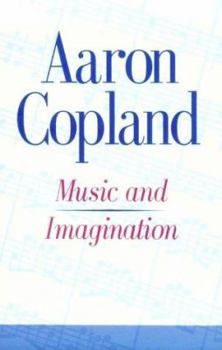Music and Imagination
Select Format
Select Condition 
Book Overview
One of the most forthright and talented of American composers writes here of the part played by the freely imaginative mind in composing, performing, and listening to music. He urges more frequent performance and more sensitive hearing of the music of new composers. He discusses sound media, new and old, and looks toward a musical future in which the timbres and intensities developed by the electronic engineer may find their musical shape and meaning. He considers the twentieth-century revolt against classical form and tonality, and the recent disturbing political interference with the form and content of music. He analyzes American and contemporary European music and the flowering of specifically Western imagination in Villa-Lobos and Charles Ives. The final chapter is an account, partially autobiographical, of the composer who seeks to find, in an industrial society like that of the United States, justification for the life of art in the life about him. Mr. Copeland, whose spectacular success in arriving at a musical vernacular has brought him a wide audience, will acquire as many readers as he has listeners with this imaginatively written book.
Format:Paperback
Language:English
ISBN:0674589157
ISBN13:9780674589155
Release Date:August 1980
Publisher:Harvard University Press
Length:116 Pages
Weight:0.40 lbs.
Dimensions:0.4" x 5.2" x 8.2"
Customer Reviews
3 ratings
Keeping in mind that this is based on lectures given by Copland
Published by Thriftbooks.com User , 17 years ago
It's not written to be a concise analysis of any certain subject, but a series of lectures that could be enjoyed at the same time that they were informative. This book provides great insight into the mind of our great American composer. He speaks on a wide range of subjects, but seems to cycle around the American classical music and it's development. He brings to mind the processes that go along with composing and creating music, and his respect and appreciation for other composers makes this a positive, uplifting but informative and thought-provoking book.
short but profound
Published by Thriftbooks.com User , 17 years ago
Of all the books out there about music, page for page this is one of the best. It's a composer's perspective on why music gets composed, and HOW it gets composed. Copland takes you into the thought processes of musical creation. If you've ever been tempted to subscribe to the idea that music is a universal language, Copland undercuts that idea by exploring the theme of music as NONVERBAL SYMBOLS in a SYSTEM of inherited sounds. The second half of the book is dated, because he's addressing issues that were contemporary in the 1950s. But the first half is well worth reading.
To learn to listen
Published by Thriftbooks.com User , 18 years ago
This book contains the text of the six Charles Eliot Norton lectures that Copland gave at Harvard. Copland thinks about Music and its meaning. He speaks about the creation and appreciation of Music as activities of the Imagination. He rails against the fuddy- duddy music scene in which all over the world a very limited repertoire of classic works holds the stage. He talks about the special affinities composers have for different types of instruments. He argues for a greater openness to new Music. He distinguishes between the capacity of the ordinary listenerer and the professional musician in terms of their ability to anticipate what is next in the score. He teaches throughout the meaning of being a listener and lover of Music.





